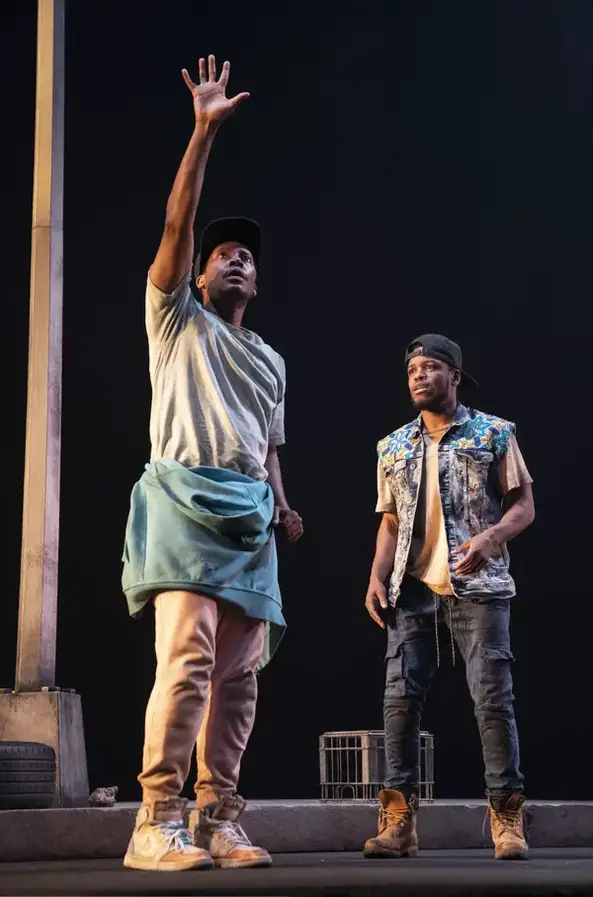What: The Broadway transfer of the West End hit, about the rise and fall of the Lehman Brothers, the family and the company.
And? Nearly a repeat visit, since I saw this identical production on the West End, though with Ben Miles in the role of Emanuel Lehman, now played by Adrian Lester. The production remains extraordinary and riveting, and Lester is superb.
 |
Adam Godley, Simon Russell Beale, and Adrian Lester.
Photo by Julieta Cervantes. |
What: The Broadway transfer of the West End gender-bent Furth-Sondheim musical about the perpetually single Bobbie and her many married friends.
And? [This was drafted before the passing of Stephen Sondheim. My opinion still stands, but I don't want you thinking I'm being callous about him or his work.] I dunno, maybe it's my fault. I went in with these expectations that the rewrite of the show, making Bobbie a woman (and making one of the couples two men about to get married) would revolutionize the narrative. Instead I feel like they backed themselves into a few ill-advised corners. The comparatively minor--but still worth noting?--shift of changing Bobbie's gender as well as Bobbie's three romantic options and the Amy-to-Jamie conversion, means that the gender balance of the cast has tilted to male-heavy, even with its female center (what was a 6m:8f ratio is now 9m:5f). Meanwhile, though it may be nice to have a queer couple in the mix, the production has backed away quickly from nearly any hint of Bobbie's queerness (a small dialog-less flirt during "Another Hundred People" aside), with the sometimes-included terrace overture eliminated and the potential of having one of Bobbie's three lovers be a woman unexplored (at least, I thought it would be a nice thought). I know the writers have been historically resistant to inferences that Bobby is gay and that's why he can't commit to a woman, but if this new revisal is acknowledging queer commitment, then that argument is now invalid. And then choosing to make Jamie and Paul the gay couple means that Bobbie's mid-show proposition makes next to no sense. It needs to be absurd because she's asking someone who loves someone else, not because she's asking a gay man to marry her.
More than that, though, this portrayal of Bobbie sets itself up for failure from the start. Male Bobby is positioned as a problem to be solved--someone incomplete, deliberately removed from living his life, with the genuine wish for real partnership and connection his end-of-play evolution. A female Bobbie with that same lack and arc butts up against more contemporary dialog about how women don't need a relationship to complete them. And indeed, Katrina Lenk's Bobbie doesn't seem to be lacking anything. She's not a problem to be solved. The scenic design is more obsessed with her turning 35 than she is (there are 35 markers everywhere you look--address plaques, wall art, even the clocks are set to 3:05). Meanwhile, they've inserted transitional moments when she hears a baby crying in a void and keeps trying different glittery keys to unlock her next option. Is this a nod to 35 being the marker for a "geriatric pregnancy?" Is it about her biological clock? If it is, why--in a script reflecting heavy revisions to both libretto and lyrics--is there nothing in the dialog about this at all? Even the couples with kids have their dialog revised to reduce reference to children (David and Jenny are no longer worried about waking the kids, but about bothering the neighbors). Meanwhile, when Joanne propositions Bobbie in the penultimate scene (here offering up Larry to Bobbie, rather than herself, because no queer ladies allowed), they reverse the dialog in a way that negates any sense that Bobbie may have been craving motherhood--Bobbie doesn't ask, as Bobby did, "who will I take care of?"; she asks "who will take care of me?" What? No. (Note: I just checked the published script from the West End production and this dialog reversal doesn't happen, which means they added it for the U.S. run? Why?) In this production Bobbie becomes even more of an inactive presence than in past productions, and you can't have a void as your centerpiece. You just can't.
The other big trickle-down flaw here is I think director Marianne Elliott quite simply doesn't trust the audience with any intelligence. There's very little nuance or complication of any relationship (see: the elimination of any hint of Bobbie's queerness), everything is Right There to be easily and lazily consumed, no subtext necessary, and there are so many missed chances, so many unexamined facets. It's very surprising to me, because I thought Elliott did excellent work with The Curious Incident of the Dog in the Night-Time and War Horse, but so much of this revisal just misses the mark for me. The choreo and scenic design are unnecessarily busy during "Another Hundred People," as if she doesn't trust the music, lyrics, and Bobby Conte's performance to convey the beautifully frantic but purposeful energy of New York (can we talk about how much I hated the giant letters caroming around the space--a choice that, per production photos, was added between the West End run and Broadway). And "Tick Tock," well, that's a choice I guess.
So maybe it's my fault I was so disappointed, because the people around me seemed to enjoy the night readily enough. John Doyle's 2006 revival finally convinced me this show could make sense, could have a true throughline for its protagonist, and he won me over. And now I can't stomach seeing a production just misunderstand the point of the show (why would you cut Sarah telling Harry she loves him? That line is key to buttoning the scene, as well as pivoting to the next song!) and not even bother to activate its central character. I thought West End directors were supposed to give us the smarter versions of Sondheim musicals? Or are the distinctions I've noted between the West End and Broadway productions an indication that it's not audiences Marianne Elliott doesn't trust as a whole, but specifically those idiot Americans? Gee, thanks.
Fine, fine, let's talk about what's good. Patti Lupone delivers Full Patti (no surprises, but no disappointments). Jennifer Simard ends up being the real comedic treat of the production, stealing the show with every single line delivery, doing yoga stretches that allow her to steal a brownie when no one is looking, and throwing Christopher Sieber around the stage. The vocals and choreo for "You Could Drive a Person Crazy" truly delight (a wonderful harmonic blend of Claybourne Elder, Bobby Conte, and Manu Narayan). But beyond that I can't say that anyone in the show (powerhouse comedic cast though they be) surprised me in any way. They were fine, they didn't get in the way of the show, but they didn't give me something new.
And I guess, with this production, I was expecting something new.
 |
Katrina Lenk, center, as Bobbie, with cast of Company.
Photo by Brinkhoff-Moegenburg. |































